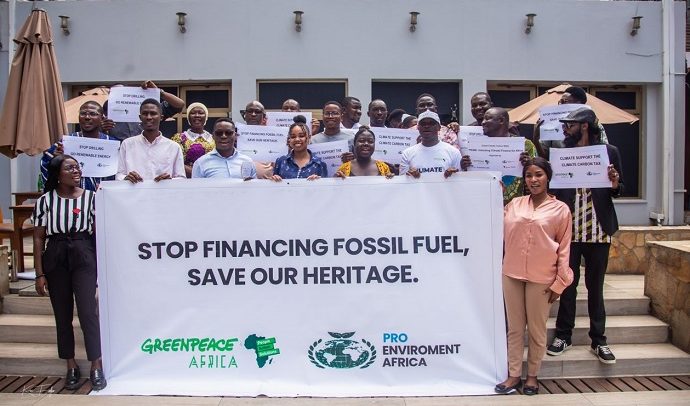Greenpeace Africa, Others Demand Climate Damages Tax
The call comes as part of activities marking the commemoration of this year’s Global Week of Action on Climate Finance under the theme: “Unlocking Climate Finance for Africa.”

Ahead of the Conference of Parties (COP29), Greenpeace Africa (GPAF) in collaboration with Pro Environment Africa and other climate-based civil society organisations (CSOs) across the continent, has among others, called for an introduction of what it termed as the ‘Climate Damages Tax (CDT)’ – a concept which seeks to make the highest contributors to climate emissions bear the costs needed in addressing same.
According to the group, wealthy countries under the Organisation for Economic Cooperation and Development (OECD), must introduce the CDT which could generate about $900 billion by 2030, starting in 2024 at a proposed initial rate of $5 per tonne of CO2e, and increasing by $5 per tonne each year.
- Advertisement -
“The costs of climate change should be borne by those with the highest responsibility for causing it – the most polluting countries, corporations, and individuals – and by those most capable of paying,” said Mrs. Ruby Brown, Women for Sustainability Africa lead, on behalf of the group at a press conference in Accra yesterday.
- Advertisement -
The call comes as part of activities marking the commemoration of this year’s Global Week of Action on Climate Finance under the theme: “Unlocking Climate Finance for Africa.”
According to the group, there was the need for the New Collective and Quantified Goal (NCQG) to respond to the need for significantly scaled-up international public climate finance, and that making polluters pay offers an equitable approach to raising much-needed revenues.
“The NCQG needs to acknowledge the need for the fossil fuel industry and other high-emitting sectors to pay for the harm and destruction caused by their products,” they insisted.
- Advertisement -
Additionally, wealthy countries must fulfil their obligations under the United Nations Framework Convention on Climate Change (UNFCCC) and Paris Agreement in terms of providing the means of implementation for developing countries to address climate change, in line with the principles of equity and common but differentiated responsibilities in the light of respective capabilities (CBDR-RC).
This, they explained, would ensure that Africa’s shift from fossil fuels to renewable energy is just and inclusive.
“Climate finance should support the retraining and reskilling of workers in the coal, oil, and gas sectors, providing them with new opportunities in the emerging green economy. This approach helps to protect livelihoods while advancing climate goals.
“In the face of blockbuster profits for fossil fuel companies, rising greenhouse gas (GHG) emissions and vast human suffering linked to climate-induced extreme weather events, the moral, economic and environmental case for making the fossil fuel industry and other high-emitting sectors pay has never been stronger,” Mrs. Brown added.
Source:dailyguidenetwork.com
- Advertisement -



